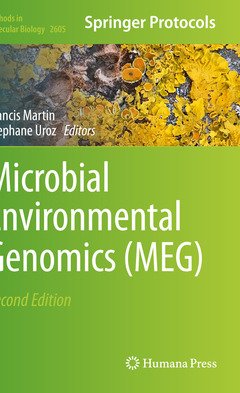Microbial Environmental Genomics (MEG) (2nd Ed., 2nd ed. 2023) Methods in Molecular Biology Series, Vol. 2605
Coordonnateurs : Martin Francis, Uroz Stephane

This volume guides researchers on how to characterize, image rare, and hitherto unknown taxa and their interactions, to identify new functions and biomolecules and to understand how environmental changes condition the activity and the response of the organisms living with us and in our environment.
Chapters cover different organism types (i.e., archaea, bacteria, fungi, protest, microfauna and microeukaryotes) and propose detailed protocols to produce high quality DNA, to analyse active microbial communities directly involved in complex interactions or processes through stable isotope probing, to identify and characterize of new functional genes, to image in situ interactions and to apply bioinformatics analysis tools to complex metagenomic or RNAseq sequence data. Written in the successful Methods in Molecular Biology series format, chapters include introductions to their respective topics, lists of the necessary materials and reagents, step-by-step, readily reproducible protocols, and notes on troubleshooting and avoiding known pitfalls.
Authoritative and cutting-edge, Microbial Environmental Genomics (MEG): Methods and Protocols, Second Edition aims to serve as a primary research reference for researchers in microbiology working to in the expanding field of molecular ecology and environmental genomics.
Date de parution : 12-2023
Ouvrage de 365 p.
17.8x25.4 cm
Date de parution : 12-2022
Ouvrage de 365 p.
17.8x25.4 cm



